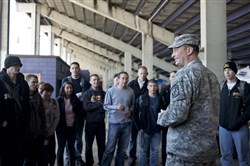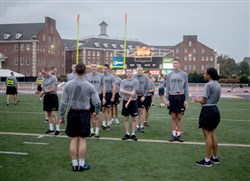VOL. 37 | NO. 47 | Friday, November 22, 2013
Even after reprieve, state ROTC cadets face uncertain futures
By Hollie Deese

Sarah Short, third from left, listens as Lt. Col. Dominic Ciaramitaro, TTU professor of military science, tellis the cadets at a meeting Thursday of the Army’s decision to keep the ROTC program open.
-- Photo: Ben CordaSarah Short, 18, had carefully planned her college future – and, then the U.S. Army threw her a curve.
At Murfreesboro’s Siegel High, she’d spent all four years in the Army Reserve Officers’ Training Corps (ROTC) program. She continued her military training at Tennessee Tech, a school she’d chosen instead of hometown Middle Tennessee State University because of Tech’s affordability and the quality of its nursing program.
What Short could not have unanticipated came on Oct. 2, when cadets at 13 schools nationwide, including Short and her Tech classmates, were informed that ROTC programs would close down for good at semester’s end.
A few days later, all of the university programs were given a reprieve, but with new conditions soon to be put in place by the Army, putting the burden on the schools to meet the Army’s needs and prove that ROTC is the right fit at the school.
“To be honest I was pretty devastated,” Short says of the original announcement. “It was pretty much the worse thing ever. I thought I had everything figured out, and then out of nowhere, everything came to a halt, and I had to figure everything out again.”
Shutdowns could well be back in the picture long before Short graduates. Including Short, 69 cadets are enrolled at Tennessee Tech, and none can be sure the reprieve will last or that the school can meet the new criteria currently under review by the Army.
High school seniors who have made a decision based on ROTC programs could also be re-thinking college plans.
In addition to Tech, the University of Tennessee at Martin and East Tennessee State, were initially told to cease ROTC operations.
The 13 schools were selected as part of an effort by the army to redirect resources to more populated areas with current low recruiting rates.
Those schools on average yielded less than 15 commissioned officers each year and have a combined 900 cadets. Tennessee Tech has graduated 1,662 commissioned officers since 1950.
“These closures are necessary changes that allow for more efficient use of available resources within the command, while maintaining a presence in all 50 states,” says Karl F. Schneider, acting assistant secretary of the Army for Manpower and Reserve Affairs, in a statement last month.
The reprieve offers hope, but puts the universities in the position of having to prove the school’s ROTC fits the Army’s plans.
“They are going to give us new criteria that we have to meet and give us an annual review to see if we are meeting that criteria,” says Lauren Schull, with TTU’s office of communications. “It’s a chance for us to keep the program.”

An early morning physical training session for Tennessee Tech cadets a few weeks ago on Overall Field at Tucker Stadium.
-- Photo: Ben CordaMark Ochsenbein is the director of Student Activities at TTU and was the professor of military science at the school from 1995-1999. The schools have not been informed about the details of the criteria, but he is sure recruiting will be a big part of the plan.
“Not only recruiting, but recruiting for particular majors,” he says. “We know the army wants engineering or STEM and nursing students. So we are already looking to hit the ground running to meet whatever requirements they come up with.
“We know that producing engineers and nurses is going to be a strong suit for us and we are going to see what we can do to enhance that, so it is going to require recruiting.”
Short had already moved forward with plans to drop out of ROTC so she could stay in the school’s nursing program. But since she had joined ROTC to become an officer after graduation, she was glad when the program was reinstated, if not a little put out.
“I am excited that I am going to get to stay here and do what I wanted to do, but it is a little bit of a challenge again because I have to work in the changes I just made to compensate for ROTC being gone,” she says.
Lt. Col. Joel Miller is chair of the Department of Military Science, which coordinates the ROTC program at MTSU, which has 60 contracted cadets and another 90-100 taking the first- and second-year classes.
He says he spoke with about five students from the state’s cancelled ROTC programs about transferring, and despite the programs’ reinstatement, at least one is still moving forward to transfer to MTSU in the spring.
“My recruiting officers talked with the professors of military science at those institutions and their recruiting officers to help with any transition should that take place,” he says. MTSU hired a recruiting officer just two months ago as a permanent government service position.
“It had been an additional duty that either I or my non-commission officers would take on as part of their other instructing and teaching roles in the past, but Cadet Command wisely decided that recruiting is such an important role and job, they hired 270 or so government service permanent recruiters for all of these institutions so you have continuity in that role.”
Despite the reprieve locally, pilot ROTC programs have been launched in New York City’s York College and City College, and Chicago’s Loyola University. But Ochsenbein isn’t convinced that diverting resources from lesser populated Tennessee makes sense if you look at the big picture.
“Tennessee has a history and lineage of supporting the military,” he says. “My philosophy is that the officer core in the military has to be a reflection of society, and if you look at the latest data available, 40 percent of the soldiers in the army come out of the Southeast.
“So your officer core has to support that, and your officers have to be able to identify with people from the Southeast. They are trying to change the demographics, but that is going to be very difficult to do.”
Daniel McGee, 20, of Lynchburg, is a civil engineer student at TTU who also is in the ROTC Simultaneous Membership Program, serving in the National Guard. He joined ROTC so he could become a second lieutenant, and the military pays for his tuition and room and board, in addition to a monthly stipend.
When the ROTC program appeared to have been canceled, his parents drove to Cookeville so they could discuss his options as a family. And despite the benefits the ROTC gave him, he didn’t want to leave his engineering program and made the decision to take out student loans to stay.
“I was one of the few cadets who was going to stay here and graduate and try to apply for Officer Candidate School through the National Guard or through active Army,” he says.
“No disrespect to other schools, but I like it here. It feels like home. I would rather stay here and get a degree in engineering as opposed to having to switch to another school and possibly switch majors.”